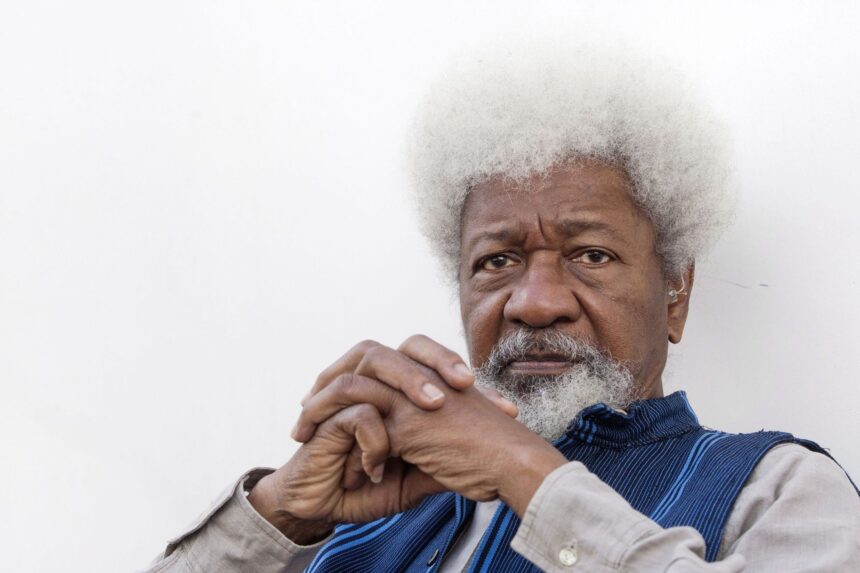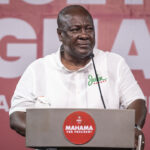Nobel Laureate Wole Soyinka has revealed that he recently declined a U.S visa reinterview invitation from the United States Consulate in Nigeria.
Soyinka, a literary giant, described the U.S. visa reinterview scheduled for September 11, 2025, as “bizarre” and questioned its timing.
Speaking to the press, Soyinka said he initially thought the invitation was a scam when he received it.
Soyinka revealed his shock upon receiving the letter, which targeted Nigerians holding B1/B2 visas, including himself.
He added that upon finding out that the invitation was real, he declined it, emphasizing his reluctance to engage with the administration of U.S. President Donald Trump, whom he compared to Ugandan dictator Idi Amin.
“I would like to begin by stressing the fact that, for me, this is not a personal issue. I have no idea how you got to know. By the way, I also have received the letter, which at first I thought was a fake. I thought it was these scammers who sort of prey on those eager to get visas elsewhere, with the promise to deliver visas for a certain amount guaranteed. I thought they just picked up my name among others because they knew there was a list of those who had been invited.
“So, at the beginning, I thought it was advance fee fraud because I had never received that kind of letter from that or any other embassy. I thought that maybe AI has been generating generic letters. It was very strange. So, by the time I came to terms with the fact that this letter is genuine, my mind just went to my relationship with individual ambassadors, Consul-Generals, and Cultural Attachés. As you know, it’s always been a courteous relationship,” Soyinka noted.
Soyinka further pointed out the date of the reinterview, saying it is insensitive for him to go to the U.S. embassy on September 11, a date he considers significant for global mourning due to the 2001 attacks.
The playwright, who previously renounced his U.S. green card in 2016 to protest Trump’s election, reiterated his lack of interest in pursuing travel to a country where he said he feels unwelcome.
He continued: “In addition, I happen to be a little bit superstitious of being given a significant date, not just for the United States but the rest of the world. I’m talking about 9/11. This is a day that I have always considered very critical for the United States, especially. To me, 9/11 should be regarded as a day of national mourning, of atonement by the Consulate of the United States.
“They should close down offices on that day, not to keep inviting people to come and have their visas taken away. It should be a day of reflection, of serious, deep thinking in consideration of so many things. I think on that day, the United States should shut down completely, universally. If they don’t shut down, at least I will shut down my relationship with them on that day. Because I’m very superstitious. I’m not going anywhere near there on 9/11. I will be airborne somewhere.
“Are we looking in the case of the United States, at the white Idi Amin, for instance? If you look very closely at the conduct, the behaviour, the mentality of the incumbent president, you find out there are Idi Amins of different colours. And if Idi Amin says I should come to his embassy, I would think twice before going because I don’t know what is waiting for me on the other side of the door.
“So I’m afraid I would have to, as the Americans say, take a rain check on this invitation, and certainly I’m not going there on 9/11. No way. Maybe individuals, small, minuscule actions like this, here and there, collectively, institutionally, and so on may enable the American people to embark on this process of deep introspection, which is really to review their position with the rest of the world and how the world looks at them especially at this critical period of world affairs.
“So that’s all I want to say on that subject at this time. But there is a lot more to say in the future. We can now sit down objectively, analytically, and ask what on earth has happened or is happening to the United States of America; perhaps in various conferences of writers, philosophers, and, of course, psychologists. Because maybe what the United States needs right now is an exorcist. It could be. We never can tell. But I’m a bit superstitious. I’m not going there on 9/11.
“People like me are in a privileged position in the sense that we are nomadic anyway. But those who actually built homes there and are suddenly told you cannot continue living there, I find it horrifying, inhuman, and dehumanising.”
Pan-Atlantic Kompass reports that Soyinka’s comments came after Nigerians started receiving U.S. visa reinterview invitations.
Many Nigerians have questioned the U.S. Consulate’s intentions behind the reinterview process.
This comes after reports emerged that the U.S. is secretly retracting or cancelling valid visas held by Nigerians.
According to reports, the U.S. began revoking visas of Nigerian citizens through formal letters sent to their emails.
In the formal letters, the affected citizens were instructed by the U.S. Embassy in Nigeria to submit their passports at the consulates in Lagos or Abuja.
Upon arriving at the consulates, the affected citizens received the news of the revocation.





